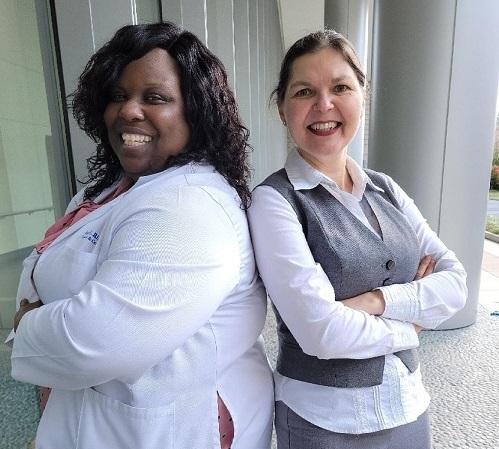
By Liz Switzer
Watching members of her Queens, New York, church die prematurely from preventable conditions, pulmonologist, critical care physician and researcher, Isaretta Riley, MD, MPH, decided to dedicate her career to medicine, and to improving the health of populations most vulnerable to adverse pulmonary outcomes. A passionate promoter of health justice, Riley is not intimidated by much in this world—except when it comes to applying for her first National Institutes of Health (NIH) Career Development (K) grant.
With a track record of success in her own research and supporting grant development by others, Irina Mokrova, PhD, director of the Department of Medicine’s Office of Research, was recruited by Scott Palmer, MD, MHS, vice chair for research, in 2019 to help develop a larger pipeline of NIH-funded investigators in the department. Her mandate is to help early career investigators like Riley get their research programs off the ground.
Working as a team, the two were successful in winning the (NIH) K01 – Coping with Asthma through Life Management (CALM) award that runs through 2026 with total funding of $807,664. It’s a major win, and not just for Principal Investigator Riley.
The Potential
“Dr. Riley’s research will help identify key mechanisms to improve race disparities in asthma health,” says grant contributor and mentor, Ebony Boulware, MD, MPH division chief, General Internal Medicine and director of Duke’s Clinical and Translational Sciences Institute. “Her work will lay the foundation for interventions that will hopefully eliminate this critical health problem in the future.”
Asthma imposes tremendous economic burdens on patients, their families, and on society, affecting Black patients disproportionately with higher rates of asthma-related hospitalizations and deaths compared to whites, notes Loretta Que, MD, interim division chief, Pulmonary, Allergy, and Critical Care Medicine, and a member of Riley’s mentorship team.
“Dr. Riley is establishing herself as an expert in health disparities research in asthma,” says Que. She has identified principal barriers driving medication nonadherence specifically in Black patients with asthma and has developed targeted interventions to reduce these barriers and improve medication nonadherence. Completion of her research could have significant impact in the future management of Black patients with asthma and medication nonadherence and result in an overall improvement of quality of life for these patients.”
The Grant
When Riley approached Mokrova for help with the CALM grant, she had some working drafts but knew the proposal needed to be stronger. “She really helped me take it to another level,” Riley says. “It's based off of the applicant’s potential, not necessarily on the bells and whistles of the research. You have to talk about all of your accomplishments. I think minorities and females don't necessarily toot their own horn as other groups do, so she makes sure you do that.”
What Mokrova is able to do for researchers like Riley is assist with the highly competitive and laborious process of NIH proposal submissions, which can take from three to five months, and provide the polish that it takes to convince grant reviews of the unique value proposition of both the researcher and the potential impact of their work.
The core of Riley’s personal narrative starts with her personal career motivation—those early experiences within the African American where family and friends had limited health care options—and her interest in science and awareness in the New York African American community as she was growing up—her interest in science and the adverse outcomes that can potentially be prevented through her NIH-funded research.
“I really encourage Isaretta to start from there because when you write a grant, you want to elicit an emotional response from the readers. They are not robots so I always try to hit those emotional notes to get them interested,” Mokrova says. “K grants are not the place to be modest because you need to position yourself as the truly the best person to fill the role. They need to understand why you deserve the chance to be supported, not just the work, and have your career take off, realistically speaking, at the expense of three or four other grants.”
The Work
What the grant means for Riley is five years of protected research time and the opportunity to team with mentors and grant contributors like Boulware, Que and Laura Streamo Porter, PhD, a Psychiatry and Behavioral Sciences professor whose research focuses on developing and evaluating behavioral interventions to help patients and their family members cope with the symptoms and psychological demands associated with chronic illness.
Riley can synthesize unique skills from each contributor through the lens of her own research experience so that she becomes a truly unique intervention specialist in African American community pulmonary health, Mokrova notes.
The main component of the grant will allow Riley to obtain large cohort patient perspectives about barriers and facilitators to pulmonary health through the use of focus group that help identify malleable factors in care, and pilot testing those factors to inform culturally sensitive responses and interventions that are most relevant to the patients themselves and may be broadly implemented throughout the nation.
“I was just blown away by Isaretta, her demeanor, her attitude and her energy,” says Mokrova. “I am absolutely thrilled for her and it’s such a fantastic feeling to contribute to the future career of such a bright star as Isaretta. We need more African American women in science because it’s really hard to break into this white man’s club. We need as many cracks in that glass ceiling as we can make.”